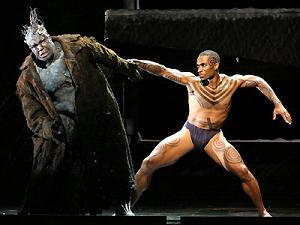Our left coast correspondent Baritenor reports:
I would not call Grendel an opera for the faint-hearted. The libretto is well-written, but the score jumps to both ends of the operatic spectrum, going from lyrical to modernistic to lyrical again in the blink of an eye. Think Benjamin Britten on crack, if you will, only with an electric guitar in the pit. While the use of two languages (Grendel and several other characters sang in English, the majority of his foes sang in Olde Englysshe) worked, less effective was the use of “shadow” Grendels to echo his statements and provide harmony in his songs.

The role of Grendel is, in the words of composer Elliot Goldenthal, “really a two-and-a-half hour monologue,” and Eric Owens provided the necessary lyricism, vocal bite, diction and passion the part calls for. He sang extremely well in the challenging role, whether booming his violent torments at human kind over blaring horns or producing an beautiful pianissimo as the monster dies, and deserves more exposure than he has gotten. After Grendel, Wotan must seem like a walk in the figurative park.
Taymor also provided ample opportunity for a fine corps de ballet, and the choreography, by Angelin Preljocaj, was a highlight of the night. The rest of the cast provided strong support in their cameo roles. Denyce Graves had the opera’s other more-than-demanding role, the elderly Dragon who gives Grendel key advice near the end of the first Act. Ms. Graves has only one scene, but she is required to go from a low E flat to a high B, I believe. She struggled with some of the lower notes on opening night, but her top opened effortlessly and she sang with great drollness as the jaded Dragon.
As the Shaper, a blind bard, Richard Croft was a standout. Given the Opera’s most beautiful melodies, he sang with the purity necessary for the spell-binding poet who enchants Grendel with his song. Soprano Laura Claycomb was beautiful in voice and figure as Queen Wealtheow, and Jay Hunter Morris provived humor and a fine Heldentenor as the blustering hero Unferth, a parody of the traditional Wagnerian hero. A fine boy soprano sang the role of Grendel as a child. Charles Robert Austin provided plenty of angst and solid low notes as Grendel’s antagonist King Hrothgar, and the three “Shadow” Grendels blended well.
In the important role of Grendel’s slayer Beowulf, here a dancer whose voice was given by the chorus, Desmond Richardson was a powerful eyebrow-raising presence, clad only in a dance belt and ritual tattoos.
I would give Grendel a positive review, not least so for Taymor’s impressive production, with one warning: at intermission, the lady next to me huffed “well, it’s not La traviata“, and I counted several walkouts. So be careful: There is modernistic music, profanity in the libretto, and it’s rather long (the first act runs about an hour and a half.) It’s probably not to everyone’s taste. It was to mine.



